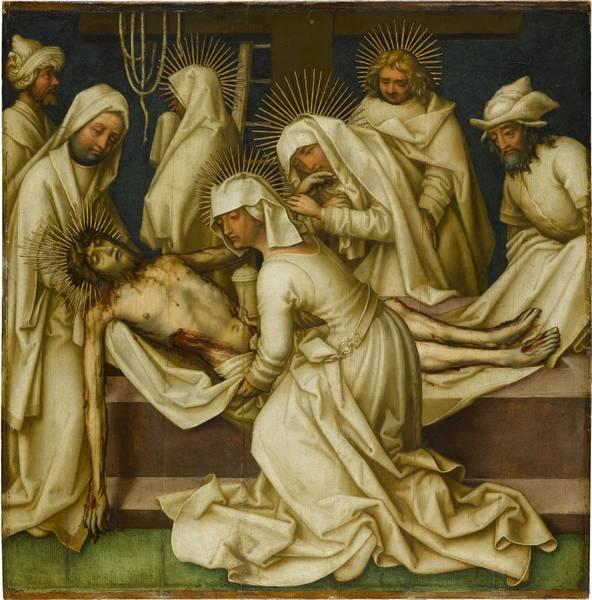Description
The painting "Lamentation of Christ" (Gris-11 passion) by Hans Holbein el Viejo, conceived around 1500, is a work that encapsulates the depth of suffering and devotion through an intimate composition and a palette of subtle and gloomy colors . Holbein, a master of the German rebirth, is known for its ability to represent the humanity of its figures and the emotional intensity of the most tragic moments of the Christian narrative. In this work, the lamentation of Christ is presented with an approach that reflects the influence of Gothic art, while, at the same time, the developments of the Renaissance are anticipated.
In the work, Christ lies dead, sustained by three figures that, although they are not clearly identified, are perceived as figures of great importance in the Christian tradition. The composition is organized so that the characters flow to the center around the inert body of Christ, which creates a strong sense of union and veneration in his figure, highlighting the sadness and the palpable grip on their faces. Holbein displays meticulous attention to the details in their clothing and facial expressions, allowing the viewer to connect emotionally with each of them.
The use of color in "lamentation of Christ" is remarkable: a scheme of gray tones predominates that not only establishes a gloomy atmosphere, but also denotes an almost monochromatic approach that can be interpreted as a symbol of mourning. Gray nuances are complemented with subtle meat ranges, which bring life to the figures, while the contrast between the pale face of Christ and that of those around him accentuates the tragedy of the moment. The light, a key element in the practice of Holbein, manifests itself in a dim and dramatic way, focusing on the hands that sustain the body of Christ and exalting the fragility and finitude of human existence.
Another interesting aspect of "lamentation of Christ" is its historical and artistic context. Holbein, who developed in an era where painting began to integrate greater naturalness and psychologic depth, built a work that not only reflects the religious devotion of his time, but also incurs a new era of artistic expression, where man It begins to be the center of visual experience. This approach to the human condition is visible not only in the expressions of pain and sadness, but also in the physical representation of the body of Christ.
Although the specific destiny of "lamentation of Christ" in the context of Holbein's career is not widely documented, it is a work that resonates with the tradition of devotional painting of its time and reflects the artistic process of a master that I continue with its legacy in subsequent works. In addition, parallels can be traced with other contemporary works dedicated to the same theme, which explore pain and loss through the lens of religious art, including the works of artists such as Matthias Grünewald or even the beginnings of his son's work, Hans Holbein the young man.
In conclusion, "lamentation of Christ" is not only a representation of mourning and loss through the tragedy of the crucifixion, but establishes a dialogue between the viewer and the intrinsic emotionality of the fact. With an exceptional ability to capture the moment, Holbein offers a poignantly human vision of an eternally transcendent theme. This work is a testimony of his genius and his place in art history, where the sadness of the human condition becomes a universal experience that continues to resonate almost five centuries of its creation.
KUADROS ©, a famous paint on your wall.
Hand-made oil painting reproductions, with the quality of professional artists and the distinctive seal of KUADROS ©.
Reproduction service paintings With a guarantee of satisfaction. If you are not completely satisfied with the replica of your painting, we refund your money 100%.

